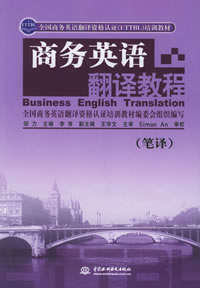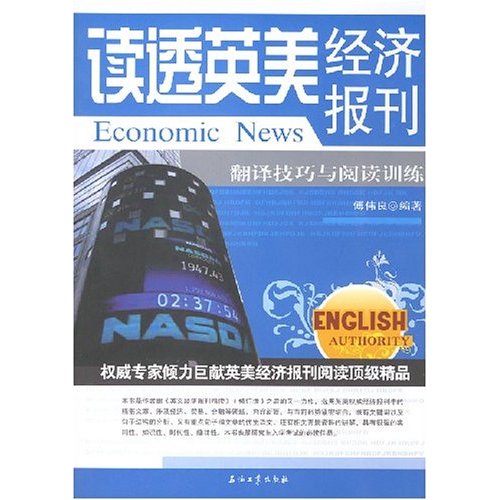Getting Started as a Translator:Gleanings from Honyaku (第一部分)
作者:古龙 2009-07-04




语际翻译公司 转载请注明https://www.scientrans.com
∗本栏目部分文章内容来自互联网,部分已经过本站编辑和整理,如有版权事宜请联系Email/MSN jesczhao@hotmail.com
I would also echo the advice of getting your start by working in house for a while. That's the path I took myself. Also, even if your long-term goal is to live and work in some country other than Japan, you might consider working in Japan for several years as a translator. I would argue that when you are getting started in the profession, the enriched language environment that comes from living in Japan will make for more rapid progress. Also, many references you will want to use will be cheaper to buy here.
Translation is a subtle art. I started full of confidence and quickly realized how little I knew about Japanese (and English!). That's when you really start to learn. My wan-pointo advice: Learn to recognize when you don't know something. The thought, "That's probably right," is usually wrong.
Dan Kanagy
________________________________________
I think this assessment is pretty good:
> It's beginning to look like one of those "need a job
> to get experience, but can't get a job without
> experience" Catch-22's that everyone hates...
To a large degree, translation success depends more on "jitsuryoku" than on qualifications on paper. However, to get a chance to show off your "jitsuryoku", you need some kind of qualifications on paper. Two years of college Japanese certainly doesn't impress anybody that knows anything about either language learning or translation.
Several people have suggested the option of looking for an in-house translation job. I think this is probably a good idea. Depending on what your career goals are, another way to do it is to find a non-translation-related job and work on finding translation jobs on the side. This is the path I took. If your main goal is to be a full-time translator, it might not be the best path, but it has the advantages of providing a stable income to support you while you get started in translation, as well as providing (potentially) a solid background and depth of experience in some field (which may then be leveraged for your translation work).
As far as finding translation work, if you have decent skills, you should be able to leverage the "kone" you have already developed. You should have a decent relationship with your college instructors, which should already know (and hopefully be impressed with) your skill level and potential. You said you spent a year in Japan -- you should have people you know from that experience who are similarly impressed with you. My first non-coursework translation came as part of a different job (summer internships and part-time work developing Japanese language instruction software), and my first freelance work came from people I already knew -- instructors I had taught for, companies I had interviewed with, friends from school that now run their own Japan-related businesses, etc.
This mailing list is another good resource. If you are participating in the list, showing the translators here that you have good skills and something to contribute, you may be able to get some work through them.
This is a relatively slow way to get into translation, and will probably only be possible if you have some other means of support (like a day job). You need to have some way to survive while you're building up enough translation customers to support you.
It also is a difficult path, in some ways. While it takes away the pressure of having to find enough work to pay the rent, it also means that your time is very limited, since you already owe 8+ hours a day to your "real" job. In the feast-or-famine world of translation, that means that you'll have to turn down some of the feast that you could otherwise be profiting from. If you're doing mostly agency work, too, that can really hamper things, since it probably doesn't take to many times turning down jobs before they take you off their list. If you find an agency that's small enough that they get to know you personally, and if they like your work, they'll be more forgiving.
> In any case, I do have a couple of specific questions. First,
> do you recommend sending samples of my Japanese
> writings with my resume?
Only if they're good. :) I never have, but then I haven't done much "cold calling", that is, calling potential clients without an introduction or specific lead, either.
- 评论
- seme:文章内容文章内容文章内容文章内容文章内容文章内容文章内容文章内容文章内容 章内容文章内容文章内容文章内容文章内容
- seme:文章内容文章内容文章内容文章内容文章内容文章内容文章内容文章内容文章内容 章内容文章内容文章内容文章内容文章内容

- 谈翻译观念的嬗变与翻译技能的训练
2009-6-15 15:33:10 - 《高等学校英语专业英语教学大纲》中规定,大学生通过四年的在校学习,“能运用翻译的理论和技巧,将英美报刊上的文章以及文学原著译成汉语,或将我国报刊、杂志上的文章和一般文学作品译成英语……。译文要求忠实...
- 翻译与网络营销
2009-6-11 0:02:31 - Translation and Your International E-Commerce Strategy Most businesses realize that they ...
期刊征稿
- 第四届IEEE生物信息与生…
2009-6-30 19:42:01 - 基本信息 主办单位: 四川大学,IEEE生物医学工程协会(EMBS) 承办单位 开始日期 2010/06/18 结束日期 截稿日期 2009/1...
- 第九届全国光电技术学术…
2009-6-30 19:35:58 - 基本信息主办单位: 中国宇航学会光电技术专业委员会承办单位 开始日期 2009/11/01结束日期 截稿日期 2009...
















